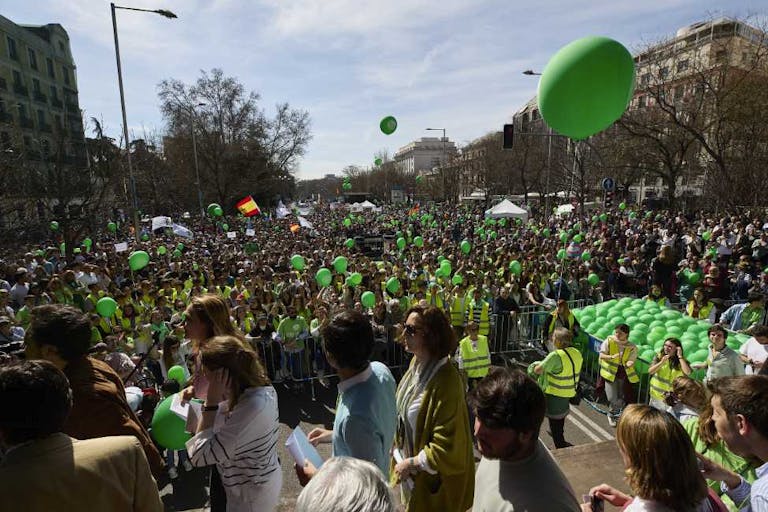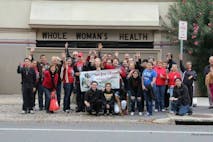Lo de hoy ha sido❤️ #SíALaVida

Spain’s ‘Yes to Life’ march unites thousands to celebrate and promote the right to life
Activism·By Catherine Livingston, PhD
Spain’s ‘Yes to Life’ march unites thousands to celebrate and promote the right to life
“You can’t be a Catholic and support abortion!” This line is not uncommon among Catholics who stand for life, and it’s no surprise that was one of the chants resounding through the streets of Madrid as a reported 50,000 people participated in the annual “Yes to Life” march.
While normally held on March 25, the International Day for Life, the “Yes to Life” march was held early this year, on March 12. The Catholic News Agency reports that the march was supported by more than 500 organizations which make up the Yes to Life platform. CNA says that “the sponsoring organizations expressed their opposition to ‘all laws and practices that threaten life and human nature at any moment of its existence, as well as the businesses and ideologies that sustain them.’” The organizations also promised to work so that “no illegitimate and perverse law be in force in our legal system,” advocating “that Spain must be an advanced nation, progressive in terms of true rights and conservative of objective and perennial values.”
The Jérôme Lejeune Spain Foundation posted a clip of the march its Twitter page:
As evidenced from even this short video, the march took a “celebratory” tone. However, as OneofUs.eu reports, it wasn’t all celebrating, as there was a heavy and important message.
As recently as last month, Spain’s parliament expanded abortion access in the nation that decriminalized abortion in 1985, as reported last year by France24.com. The latest legislation, according to PBS, “builds on legislation passed in 2010 that represented a major shift for a traditionally Catholic country, transforming Spain into one of the most progressive countries in Europe on reproductive rights.”
Spain’s recent move now permits 16- and 17-year-olds to have abortions with no parental consent. It also allows state-run health centers to offer free hormonal contraceptives and the morning after pill. In addition, PBS adds, the recent changes, “enshrine in law the right to have an abortion in a state hospital. Currently more than 80% of termination procedures in Spain are carried out in private clinics due to a high number of doctors in the public system who refuse to perform them — with many citing religious reasons.”
Pro-life doctors are permitted to opt-out of committing abortions if they have previously registered objections in writing, the story reports; however, the expansion alone makes killing preborn babies even easier than it was a year ago in the heavily Catholic nation.
Thus, the “Yes to Life” rally both celebrated life and raised awareness of the human right to life from fertilization onward.
Article continues below
Dear Reader,
Have you ever wanted to share the miracle of human development with little ones? Live Action is proud to present the "Baby Olivia" board book, which presents the content of Live Action's "Baby Olivia" fetal development video in a fun, new format. It's perfect for helping little minds understand the complex and beautiful process of human development in the womb.
Receive our brand new Baby Olivia board book when you give a one-time gift of $30 or more (or begin a new monthly gift of $15 or more).
Multitudinaria manifestación en Madrid contra la "cultura de la muerte" de leyes como la del aborto y la eutanasia europapress.es/sociedad/notic… a través de @ep_social
Catholic News Agency also reports on powerful testimonies of women who found hope and help from pro-lifers in Spain. This included stories of Marita and Melissa, both of whom were recommended by their social workers for abortions.
Marita, appearing with her son, Santiago, said when she discovered she was pregnant, a social worker suggested abortion, but she encountered 40 Days for Life volunteers and this ultimately saved Santiago’s life. “They helped me make the decision. I went over to them myself and asked them for help…” she said. “I decided not to go [into the abortion clinic]. Today I am here with my son, which is the best thing that could have happened to me.”
Melissa, another participant, took the stage, pregnant with her fourth child. “The social worker [asked] me what am I going to do with so many children, where am I going; that [abortion] is the ideal thing to do,” she said. Instead, she reportedly “ talked to the John Paul II Rescuers and More Future Foundation volunteers, who gave her the support she needed to continue with her pregnancy.”
Testimonies like this are why pro-lifers continue to fight. The value of human life is what makes up Yes to Life’s manifesto; the document was read by different representatives of the 500 organizations supporting the event. All declared and agreed that “human beings have the right to life and to be treated as their dignity deserves, from their conception to natural death and at all times and in all circumstances.”
The International Day of Life, as One of Us notes, began in 2003 in Madrid as a result of “a global survey answered by more than 20,000 groups and associations from more than 20 countries in Europe and America, [where] it was agreed to declare March 25 the International Day of Life.” By 2011, the groups and associations “agreed to create a platform with the name and motto Yes to Life, which each year would celebrate a public and unitary act around March 25, International Day of Life, with the color green hope, so that all organizations could see it.”
CNA reports that the march concluded with the participants “releasing balloons into the air following a minute of silence during which only the heartbeat of a baby obtained from a live ultrasound was heard.”
Live Action News is pro-life news and commentary from a pro-life perspective.
Contact editor@liveaction.org for questions, corrections, or if you are seeking permission to reprint any Live Action News content.
Guest Articles: To submit a guest article to Live Action News, email editor@liveaction.org with an attached Word document of 800-1000 words. Please also attach any photos relevant to your submission if applicable. If your submission is accepted for publication, you will be notified within three weeks. Guest articles are not compensated (see our Open License Agreement). Thank you for your interest in Live Action News!
Read Next

Three Texas cities become 88th, 89th, and 90th 'Sanctuary Cities for the Unborn' in US
Mark Lee Dickson
·More In Activism

Guest Column
Three Texas cities become 88th, 89th, and 90th 'Sanctuary Cities for the Unborn' in US
Mark Lee Dickson
·
Guest Column
Two Texas cities become 86th and 87th Sanctuary Cities for the Unborn in US
Mark Lee Dickson
·
Guest Column
13th Texas county outlaws abortion and use of roads for ‘abortion trafficking’
Mark Lee Dickson
·
Activism
Activists arrested for blockading doors at TN Planned Parenthood
Nancy Flanders
·
Politics
Supreme Court hears oral arguments in pivotal NJ pregnancy center case
Nancy Flanders
·More From Catherine Livingston, PhD

Human Interest
Stray dog rescues abandoned baby thrown in trash heap in Lebanon
Catherine Livingston, PhD
·
International
New Zealand saw 257 people die from assisted suicide in one year
Catherine Livingston, PhD
·
Newsbreak
FBI offers reward for attack on pregnancy center in Des Moines
Catherine Livingston, PhD
·
Human Interest
Preemie born at 26 weeks ‘defied the odds’ after battle with sepsis
Catherine Livingston, PhD
·
Human Interest
Pregnancy center replaces long-time abortion facility in Texas
Catherine Livingston, PhD
·